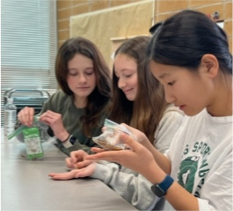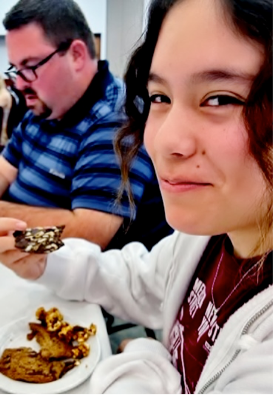Shifting a Cultural Mindset: Middle School Students Consider the Future of Food

Whether collecting, observing, or using bugs to torture siblings, insects have always been a part of childhood, and kids and bugs have always formed an instant relationship. But, what about eating them?
Students in the Thinking and Doing Program (TAD) in Salisbury, Md., are discussing the future of food in 2050. Simple math points to a major question: Will there be enough food and water resources to continue raising cattle with traditional methods? Because 70% of the families in this program eat meat, how can students ensure food security for their families?
The solution the TAD students are considering is called the One-Quarter Lifestyle. To ensure food security, this means developing a food blog with recipes consisting of ¼ traditional meat products, ¼ plant-based, ¼ lab grown, and ¼ insect-based. Although lab grown meats and insects are not yet widely available or affordable, many companies are developing both.
Recently, the University of Maryland Eastern Shore hosted Joseph Yoon, a Brooklyn-based chef known for his insect cuisine. Working with a UMES food and agricultural sciences doctoral student, Ebony Jenkins, Yoon is educating the public about the nutritional value of insects. Yoon’s company, Brooklyn Bugs, sends “insect ambassadors” to schools, communities, and universities to talk about the health and food sustainability benefits of eating insects.
With the help of research from such “insect ambassadors” as Jenkins and Yoon, TAD students are asked to think about the shifting concepts of food. Since many cultures have eaten insects for thousands of years, TAD students are reevaluating Western ideas of insects as food.
The Farm-to-Table concept is also being explored by students to continue more traditional food consumption. TAD visited Ard Brac Acres in Pittsville, Md., to learn what “clean eating” and “zero-mile diet” mean. Clean eating refers to knowledge of the diet and husbandry of the animals, and zero-mile diet refers to consumption directly from the farm.
TAD students spent two days with the owner of Ard Brac Acres, Amanda Ruchalski, learning how the movement of a “chicken tractor” can improve the overall health of the farm. A chicken tractor is a portable chicken coop without flooring and with a rotational schedule. The aim is to clean the farm of ticks, grubs, and other problematic insects, and provide a varied diet to the chickens.
Whatever the eating habits of the students’ families, a cultural shift in what and how people eat is inevitable. A change in mindset always begins with risk takers, our children as we find ourselves working to create responsible, sustainable food consumption for the future.
And most kids are thrilled to learn that crickets contain more protein than spinach! As the TAD students say, “Bug Appetit!”
April Todd, a graduate of Washington College and Salisbury University, is a problem-based teacher with Wicomico County Public Schools. April instructs TAD (Thinking and Doing) for grades 6-8 at Salisbury, Pittsville, and Mardela Middle Schools. In 2008, she was named Maryland Teacher of the Year, and she was a 2021 Maryland Educators of Gifted Students Teacher of the Year. This is her 24th year in education. April plans to learn and laugh with her students for many years to come.
Common Sense for the Eastern Shore











